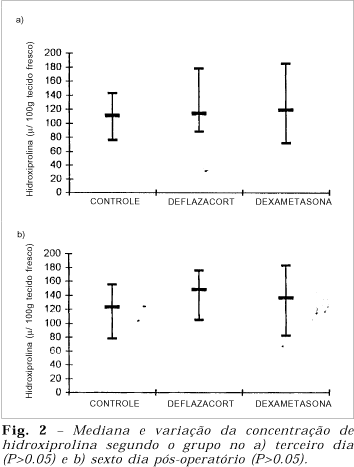BACKGROUND: Deflazacort, a new corticosteroid is claimed to induce less collateral effects than other corticoids. The aim of this study was to investigate the effect of this drug on the healing of colonic anastomosis. MATERIAL AND METHOD: 75 Wistar rats were randomized to receive daily by gavage, one of the following treatments: control group (N=24) - 1 ml of saline; deflazacort (N=25) - 1 ml of this drug containing 0.15mg/ml (0,1 mg/kg/day), and dexamethasone (N=26) - 1 ml containing 0.03 mg/ml of this drug (0.5 mg/kg/day). After 6 days of treatment, the animals underwent laparotomy followed by section and immediate colonic anastomoses in a point 2 cm above peritoneal reflexion. Treatment in each group was carried out until the animals were killed on the third of a six postoperative day. At necroscopy, signs of peritonitis and anastomotic dehiscence were registered. Anastomotic site was tested for tensile rupture and biopsies containing all layers were sent for hydroxyproline and protein measurements. RESULTS: There was no difference in the peritonitis and anastomotic dehiscence rates among the groups. Bowel rupture pressure was similar at day 3 but significantly higher in controls (180 [150-230] mmHg) than in deflazacort (150 [120-180] mmHg) and dexamethasone groups (140 [100-180] mmHg) at day 6. No difference occurred in the hydroxyproline concentration. Protein content was higher in dexamethasone group than in controls on the third postoperative day. CONCLUSIONS: Corticosteroids may impair colonic anastomotic resistance and deflazacort may have similar deleterious effects of dexamethasone in anastomotic healing.
Colon; Steroids; Anastomoses; Wound healing; Deflazacort



